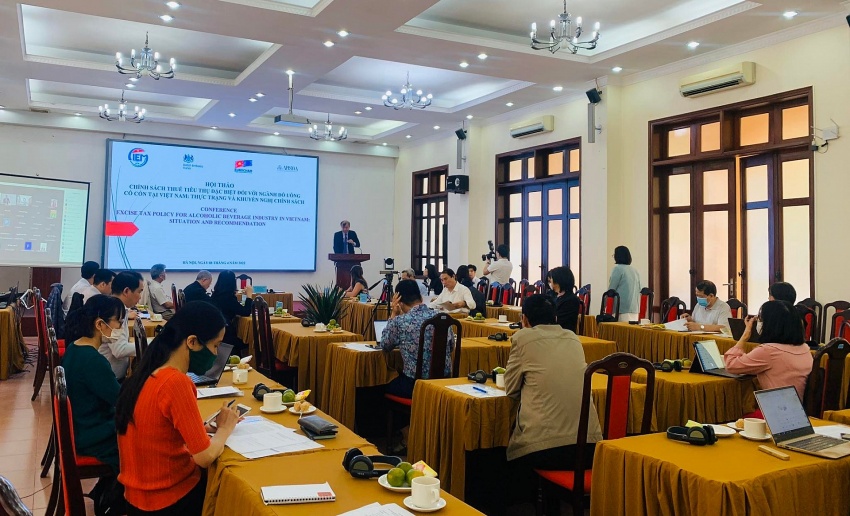Proposal to change the excise tax on alcoholic beverages
 |
| Proposals to change the tax on alcoholic beverages |
Over the past 15 years, duty for the wine and spirits industry has been adjusted five times. The tax increased from 50 per cent in 2015 to 55 per cent in 2016, and then rose to 65 per cent in 2018. The taxable price also changed from the import price to the wholesale price.
These changes aimed to limit consumption to protect people's health and minimise other negative social impacts of alcohol consumption.
Cuong emphasised, “There are still many issues that need to be discussed. For example, the method of taxation, the policies in other countries, the appropriateness of this approach, and the disproportionate impacts on different target groups.”
Ludovic Ledru, representative of Eurocham's Wine and Spirits Sector Committee feels that the relative tax rate between high- and low-quality products is unfair. It also encourages consumers to use low-cost products with moderate or high alcohol content.
“Instead of policies aimed at promoting the formalisation of informal sector production such as simplifying the registration process, increasing the excise tax will further discourage producers from registering to evade taxes, affecting legitimate enterprises," said Leru.
In the opinion of Dang Thi Thu Hoai, head of CIEM's Department for Sector and Sectoral Economic Research, the effectiveness of management policies for alcoholic beverages and tax calculation methods create notable issues.
According to the CIEM researchers, the relative tax method on the wholesale price of products is ineffective in reducing consumption, protecting consumers' health, and ensuring state budget revenue.
Currently, many developed countries have switched to mixed or absolute taxation.
To fit with the situation in Vietnam, the CIEM research team has assessed the effectiveness of the mixed tax method.
The study provided five scenarios:
• Scenario 1 is to keep the relative tax method unchanged and increase the tax rate according to the roadmap
• Scenario 2 is to apply a mixed tax method, combining both the relative tax on the wholesale price of products and the absolute tax per litre
• Scenario 3 is similar to scenario 2, but the absolute tax is based on a litre of pure alcohol (LPA) instead of per litre of the final product
• Scenario 4 is to sharply reduce the relative tax from the second year and sharply increase the absolute tax per litre consumed
• Scenario 5 is similar to scenario 4, but the absolute tax will apply per LPA instead of per litre consumed
The increase in state revenue from the alcoholic beverage industry would be outstanding, especially in the second to fifth scenarios, rising by 63-75 per cent.
Hoai said that it is necessary to stabilise the policies to help businesses recover after the pandemic. This is a solution to enhance revenue in the long term and improve the management of the informal alcoholic beverage sector. This is a vital factor to help the government achieve its policy goals of both reducing alcohol consumption and increasing revenue.
What the stars mean:
★ Poor ★ ★ Promising ★★★ Good ★★★★ Very good ★★★★★ Exceptional
Related Contents
Latest News
More News
- State corporations poised to drive 2026 growth (February 03, 2026 | 13:58)
- Why high-tech talent will define Vietnam’s growth (February 02, 2026 | 10:47)
- FMCG resilience amid varying storms (February 02, 2026 | 10:00)
- Customs reforms strengthen business confidence, support trade growth (February 01, 2026 | 08:20)
- Vietnam and US to launch sixth trade negotiation round (January 30, 2026 | 15:19)
- Digital publishing emerges as key growth driver in Vietnam (January 30, 2026 | 10:59)
- EVN signs key contract for Tri An hydropower expansion (January 30, 2026 | 10:57)
- Vietnam to lead trade growth in ASEAN (January 29, 2026 | 15:08)
- Carlsberg Vietnam delivers Lunar New Year support in central region (January 28, 2026 | 17:19)
- TikTok penalised $35,000 in Vietnam for consumer protection violations (January 28, 2026 | 17:15)

 Tag:
Tag:


























 Mobile Version
Mobile Version